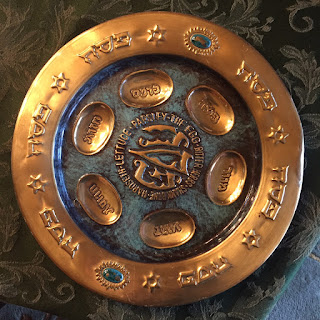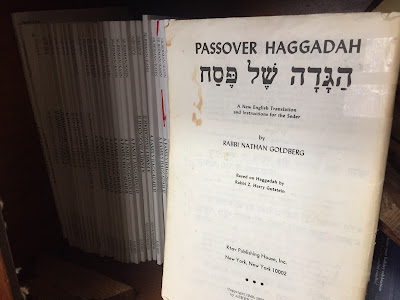Learning and Advocating Through Passover
Chag Pesach Sameach! I'm so excited; this is my favorite holiday of the entire year.
What is Passover? Also known as Pesach in Hebrew, this is basically an 8-day-long celebration of the Israelites escaping slavery in ancient Egypt. It's one of the most important Jewish holidays, and we start the whole thing with a seder: the family eats a special meal together, following a specific order of blessings, readings and songs about the Passover story, and actions like breaking a piece of matzah and washing hands.
My family usually has a giant seder with dozens of extended family members crowded into one house, but last year, along with many Jewish families around the world, we gathered over Zoom instead (I'm not sure how I feel about people calling Zoom seders "zeders"...) and this year, it was just my immediate family.
I often describe Passover to my non-Jewish friends as "the most social justice-y holiday" and that's just my personal opinion. I mean, the whole Passover story is about freedom from oppression, and a lot of modern traditions (at least, in my family and Jewish community) are about resisting not only antisemitism but all forms of oppression wherever they exist, fighting poverty, and supporting refugees.
For example, leaders in my congregation often talk about the important work of HIAS, a Jewish organization that provides services to refugees and asylum seekers and advocates for their needs (the name was originally the Hebrew Immigrant Aid Society).
 |
| The seder plate we used this year |
Another example— in religious school a few years ago, I first heard about placing an orange on the seder plate as a feminist symbol, sort of a girl power, oranges-can-be-on-seder-plates-so-women-can-do-anything message. (Fyi, seder literally means "order" so following the order of things when setting up your seder plate is a pretty big deal- everything has a specific place and special meaning.)
With a few minutes of Googling this year, I learned it's actually much deeper than the inaccurate story I heard at first. The orange on the plate symbolizes the inclusion of LGBTQ+ Jews on several levels, from the fruit representing the joy of LGBTQ+ liberation to the seeds you spit out representing rejection of homophobia & transphobia. This blog from the Jewish Women's Archive does a great job explaining the true origin of the tradition (Lerner's vexation at realizing how this history is so commonly misrepresented really resonated with me).
 |
| It's not the most photogenic of oranges, but this is the only one I could find to photograph |
I love that I've grown up with an eight-day holiday built into the year where we talk about these issues. It should go without saying that anti-oppression learning and action is year-round, lifetime work, but an annual holiday with your entire extended family in one room certainly makes for a great time to renew that commitment.
 |
| another seder plate I didn't realize we owned |
This Passover, there's so much we need to do to educate ourselves and take action. I suggest reading about what is happening to Uighurs in China and migrants at the United States' southern border, and don't stop there— advocate for human rights.
- I'm not exactly sure what actions we can take at the moment, as far as policies to support/oppose, to help the Uighurs but one thing you can do right now is read these personal stories and sign Amnesty International's petition at the bottom, and talk to friends and family about it. We need to make people aware of what's happening and build public pressure. (And if there's more I can be doing to help, please let me know! I'll keep looking.)
- One action you can take with HIAS is writing to your members of Congress about the southern border. HIAS and the ACLU are calling for the Biden administration to stop using Title 42 to close the border, an action which, as I understand it, the CDC opposed until the Trump administration forced them to do it, and Biden hasn't reversed yet.
- The link to the customizable template letter is at this link. Remember to personalize it, because your own words are more powerful!
- This Haggadah supplement on mass incarceration
- A Haggadah is the booklet that contains the order of the service for Passover seders.
- This supplement is based on the "four questions" tradition, where the youngest member of the family reads in Hebrew, asking "why is this night different from all other nights?" As Americans, we have a lot of questions to ask about mass incarceration.
- Another Haggadah supplement, this one about the women of the Exodus
- fyi, the four cups of wine are part of the seder, so that's what this is a supplement for.
- I absolutely LOVED reading this four-page insert that honors Jewish heroines and their stories. It really is a quick but meaningful read, so check it out!
 |
| We have a LOT of these! (pictured: many, many, many hagaddahs) |



Comments
Post a Comment